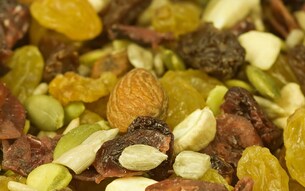|
|
|
12/10/2021 0 Comments Are raisins a healthy snack ? For the first time since 2007, the Department of Agriculture included raisins in its most recent tests for pesticide residues on fruits and vegetables, and the results are shocking: Raisins are now No.1 on the Dirty Dozen List. Of the 670 conventional raisin samples analyzed, 99 percent tested positive for at least two pesticides. On average, each sample was contaminated with more than 13 pesticides, and one sample had 26 pesticides. EWG (Environmental Working Group) does not usually analyze processed foods like raisins for their annual Shopper’s Guide to Pesticides in Produce. But because of the heavy pesticide loads the USDA found, EWG wanted to see how raisins compare to the fresh produce on their Dirty Dozen list. They found that if raisins were included in the dirty dozen list, they would rank No. 1. by a wide margin. In fact raisins would rank higher than fresh grapes, which would rank seventh. The bottom line: Raisins are one of the dirtiest produce commodities on the market – and even some organic raisins are contaminated. Children under the age of 15 eat a total of about 208 million pounds of raisins each year – about half of the raisins consumed in the U.S., according to Zion Market Research. The average U.S. consumer consumed about 1.25 pounds of raisins in 2017, the latest year for which the USDA has information. Zion’s industry analysis shows that slightly less than two-thirds of raisins are consumed as ingredients in other foods, with the rest eaten as a stand-alone snack. We’re particularly concerned about the potential hazards raisins pose to children, not just because they’re a common kids’ snack, but also because several of the most commonly detected pesticides on raisins can harm the still-developing brain and reproductive systems of infants and children. Here are some of the potentially harmful pesticides USDA found on raisins:
Our concern is not just for pesticides sprayed on crop fields. After drying, conventionally produced raisins are usually fumigated with toxic gases to control pests during storage. Fumigant residues can remain in foods after treatment, potentially posing hazards to consumer health, but the USDA does not test for fumigant residues. Fumigants are also hazardous for workers and the environment. The long-time fumigant of choice was methyl bromide – now banned for use in the U.S., except for imported or exported goods, because it damages the atmosphere’s ozone. Instead, dried fruit processors can use phosphine or sulfuryl fluoride. In a classic case of regrettable substitution, the EPA has also proposed ethylene oxide – a known human carcinogen – as another potential alternative to methyl bromide. USDA tested both conventional and organic raisins. In general, pesticides were detected less frequently on organic raisins, but in some cases, there were no differences between organic and conventional raisins. Bifenthrin and chlorpyrifos were detected about as often, at comparable levels, on both conventional and organic raisins. These pesticides cannot be used in the production of organic crops, so it is unclear why organic raisins are contaminated with these pesticides. Still, consumers should choose organic raisins when possible, since organic raisins tend to have fewer pesticide residues and can’t be fumigated. However, given that organic raisins are not pesticide free – 78 percent of organic raisins were contaminated with bifenthrin – we recommend that consumers choose fresh produce from the EWG Clean Fifteen shopper’s guide, instead of raisins of any variety. Believe it or not prunes are actually a healthier alternative to raisins which tend to be less contaminated than both conventional and organic raisins. According to USDA’s most recent tests.
Article Compliments From: https://www.ewg.org/foodnews/raisins.php
0 Comments
Leave a Reply. |
AuthorBarbara is a qualified nutritionist offering Health, Nutrition & Lifestyle Counseling. She gives Healthy weight loss advice and promotes the Mediterranean diet. She is the author of the Med Life Diet - creating healthy lifestyle habits and attitudes for life ! Archives
April 2024
|
 RSS Feed
RSS Feed
